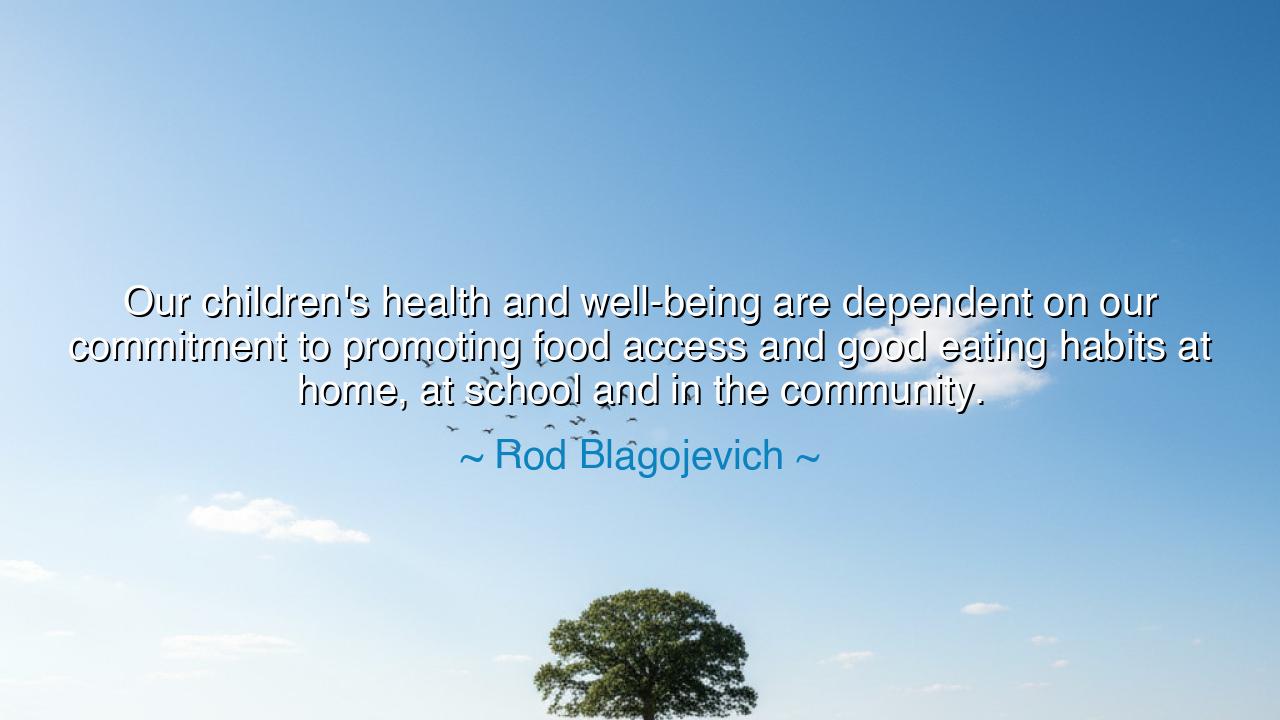
Our children's health and well-being are dependent on our
Our children's health and well-being are dependent on our commitment to promoting food access and good eating habits at home, at school and in the community.






In his earnest declaration, Rod Blagojevich once said: “Our children’s health and well-being are dependent on our commitment to promoting food access and good eating habits at home, at school and in the community.” Though spoken in a modern tongue, these words carry the gravity of an ancient truth — that the strength of a civilization is measured not by the wealth of its rulers, but by the health of its children. To nourish the young is to secure the future; to neglect them is to imperil the generations to come.
Blagojevich, once the governor of Illinois, spoke these words in the spirit of reform, as he sought to strengthen programs ensuring nutrition and wellness for the youth. His was a call not to fleeting politics, but to enduring responsibility. The “commitment to promoting food access” he invoked was more than a policy matter — it was a moral obligation. For hunger and poor nutrition are not merely personal misfortunes; they are wounds in the body of society itself. The child who cannot eat well cannot learn well, and the community that allows this cannot thrive.
Health and well-being are not born from chance, but from deliberate care. The home, the school, and the wider community form the trinity of nourishment — physical, emotional, and moral. The ancients knew this well. In the cities of old Greece, the state and family alike were guardians of youth, ensuring that the young were not only fed but educated in moderation and virtue. To care for a child was to honor the gods, for in every child lay the seed of continuity — the unbroken thread of human destiny. So too, Blagojevich’s words call us to remember that food is sacred, for it is the sustenance of life and the first teacher of gratitude.
Consider the story of Eleanor Roosevelt, who, during the Great Depression, visited schools and poorhouses where children went hungry. She saw not statistics but faces — and from her compassion grew the movement that would later form the National School Lunch Program. Through her efforts and the leadership that followed, millions of children were fed, not as charity, but as a birthright of citizenship. Her vision mirrored the same truth that Blagojevich declared: that society must feed both the stomach and the spirit, and that every meal shared is an act of civilization itself.
But the governor’s words also speak to something deeper than policy — they speak to the unity of responsibility. He reminds us that the well-being of our children cannot rest upon one pillar alone. It is not enough for schools to serve healthy food if homes are filled with processed despair; nor can parents bear the burden if their communities fail to provide opportunity and access. Each sphere — family, school, and society — must work in harmony, like the organs of one living body. When any part falters, the whole weakens.
And yet, Blagojevich’s message goes beyond food; it is a reflection of character. To promote good eating habits is to promote discipline, mindfulness, and respect for the gift of sustenance. The table is where gratitude is learned and shared. The act of eating well — consciously, compassionately — becomes a lesson in balance and care, not only for oneself but for the earth that provides. In the ancient world, meals were moments of ritual and unity; today, they remain our quietest yet most powerful acts of stewardship.
The lesson, then, is clear: the health of the young is the duty of all. Do not leave it to governments alone, nor to schools or parents in isolation. Every citizen can serve this cause — by choosing nourishing foods, by teaching children where their meals come from, by supporting programs that feed the hungry, and by remembering that to feed a child is to build a future. For what we feed their bodies becomes the foundation of their minds, and what we feed their minds becomes the destiny of the nation.
So take these words to heart: nourish your children, and you nourish the world. Let your home be a place of balance, your table a place of gratitude, and your community a garden of care. For when we teach the next generation to eat with health, wisdom, and compassion, we do not merely sustain life — we sanctify it. In this, Blagojevich’s call becomes timeless: the act of feeding our children is the first and truest act of civilization itself.






AAdministratorAdministrator
Welcome, honored guests. Please leave a comment, we will respond soon